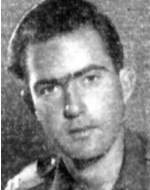Sokolski (Atzmon), Yigal Yeshayahu
Son of Frida and Avraham, was born on October 9, 1926 in Tel Aviv, completed the Mizrachi elementary school in Bnei Brak and continued to study in a gymnasium and evening classes, where he worked as a mechanic. Yigal Yeshayahu was a fan of religion and tradition, with a warm national feeling, a lot of reading and aspiring, and from the age of 15 he was a member of the Haganah, one of the first members of the religious group in Gdyn With the Dan bloc. In 1942 he served as a guard in Tel-Haim (near the Borochov neighborhood). In 1944 he was sent to the first national course for Gadna commanders. In the winter of 1947 he was deputy commander of the Gadna of the Dan Region and devoted himself enthusiastically to his duties. At the end of 1947, immediately after the United Nations General Assembly resolution of 29 November 1947 and the outbreak of the War of Independence, he joined the religious division of the Alexandroni Brigade and participated in the battles in Tantura, Jaba, Igazim and Ein Ghazal. Water course. He led the burglars to the Tel Litwinski camp, was wounded twice and before he recovered he returned to the battlefield. Was one of the participants in the fierce battle for Kolah, and the conquerors of Lod and the nearby villages. Yigal Yeshayahu wrote a diary in which he expressed his admiration of the Magshimim and his disappointment with the backward. From his youth, he had a sober world account and fulfilled his duty beyond what was necessary, for he always demanded more from himself than he did from others, knowing that it was difficult to reconcile the ideal with reality. On the 28th of Kislev 5709 (February 28, 1949) during Operation Horev, a “liquidation” operation was carried out against the “Faluja pocket” in which an Egyptian brigade was besieged. The attack took place on the eastern flank of the “pocket” in the area of Iraq al-Manshiyya. The Alexandroni forces broke into the village from the south and took over part of it, but their assault on the hill north of the village was repulsed. Meanwhile, the Egyptians recovered and attacked and forced our forces to withdraw. Part of the force was trapped inside the village. He was buried in Faluja on December 8, 1949, and was brought to rest at the Nachlat Yitzhak military cemetery.
